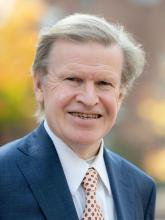The recent release on YouTube of an intercepted phone conversation between US Assistant Secretary of State Victoria Nuland and the American ambassador to Ukraine, Geoffrey Pyatt — in which Nuland blasts the European Union for its inadequate response to the protests in Ukraine — is classic Soviet-style kompromat.
The intended beneficiary was clearly Ukraine’s faltering president, Viktor Yanukovich. But who is being compromised?
On the face of it, the leak is a simple smear. It lends itself to the conspiratorial view that the international political order is an elaborate façade for brutal American power and corporate interests.
The United Nations is just a mechanism to advance American interests, at the expense of countries like Ukraine, with Secretary-General Ban Ki-moon and UN Special Coordinator for the Middle East Peace Process Robert Serry little more than cardboard figures who are needed to “glue it” for the Americans.
The revelation severely undercuts America’s image, confirming for many European leaders what they have long whispered to one another: the US not only despises their sluggish and ineffective diplomacy, but also hopes that the entire European project fails.
At the same time, it suits Russia to remind Ukrainians that another major power despises Europe.
The primary target of the kompromat, however, is a Ukrainian: the moderate reformer and economic liberal Arseniy Yatsenyuk who was just offered the post of prime minister.
Assuming that US diplomatic support undercuts a public figure’s credibility in Ukraine (and, of course, in Russia), the revelation that Yatsenyuk — “the guy who’s got the economic experience,” according to Nuland — is America’s preferred candidate could be enough to turn Ukrainians against him. (The fact that Nuland referred to him as “Yats” has the added implication that American diplomats are so ignorant and contemptuous that they cannot even be bothered to pronounce Slavic names.)
The leak’s core message is clear: the US wants to install economic liberals, not charismatic politicians like former boxer Vitali Klitschko or passionate nationalists like Oleh Tiahnybok, in foreign leadership positions.
After all, a technocrat and former central banker like Yatsenyuk understands how the global financial system is used to camouflage the sell-out of national interests.
The portrayal of economic liberalism and internationalism as contrivances that serve exclusively foreign interests was a standard feature of Soviet rhetoric. Likewise, Russia has presented Ukraine as a beneficiary of long-term gas contracts (without acknowledging their excessively high prices), while warning that opening Ukraine’s economy to competition with EU exporters would annihilate its manufacturing sector.
The good news is that most Ukrainians are more interested in Poland’s post-communist experience, which has featured far more progress than Ukraine’s.
When the Soviet Union collapsed, wealth and other measures of wellbeing in Poland and Ukraine were more or less equivalent. In 1990, per capita GDP amounted to $1,694 in Poland and $1,570 in Ukraine, and life expectancy at birth stood at 71 and 70 years, respectively.
By 2011, however, the countries’ fortunes had diverged considerably, with Poland’s per capita GDP having reached $13,382 and Ukraine’s languishing at $3,576.
Likewise, while Poland’s life expectancy at birth had risen by five years, to 76, Ukraine’s had risen by only one, to 71.
Today, Ukrainians wish to achieve similar levels of prosperity and security by emulating Poland’s economic model, which took advantage of an open international system to spur progress.
But Poland has prospered not only because it embraced radical economic reform; its success in escaping the suspicion and mistrust that Soviet leaders used to perpetuate their power was also critical to its success.
In the 1980s, for example, the Soviet leadership warned that any reform would enable Germany to control Poland. Indeed, it responded to the Polish opposition’s rise by castigating them as tools of Western power, stalking horses for American or German interests that would ultimately exploit ordinary Poles.
At the same time, the communist government emphasised how incoherent the opposition was, owing to the tensions inherent in a marriage of economic liberals, leftist workers, conservative Catholics and nationalists.
Nurturing suspicions about who was backing whom helped to drive wedges between the various groups.
Polish Foreign Minister Radoslaw Sikorski’s recent call for more assertive leadership by Germany demonstrates how different Poland’s worldview is today. It is precisely the kind of shift that the release of the intercepted phone call aims to obstruct in Ukraine.
Recent revelations from WikiLeaks and the former US intelligence contractor Edward Snowden have helped to breathe new life into Cold War stories, with leaked cables, memos, e-mails and phone calls fuelling conspiracy theories in countries like Ukraine and Russia — theories that have been energetically promoted in the Russian media.
In this sense, the Internet has facilitated the emergence of a new age of carefully orchestrated paranoia — one that threatens to obstruct much-needed political and economic progress.
Harold James is professor of European studies at Princeton University. Marzenna James is a lecturer in politics at Princeton University. ©Project Syndicate, 2014. www.project-syndicate.org













